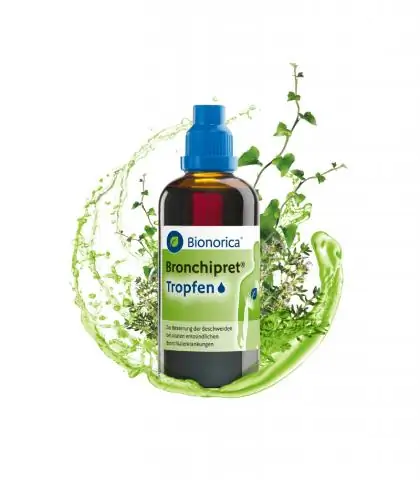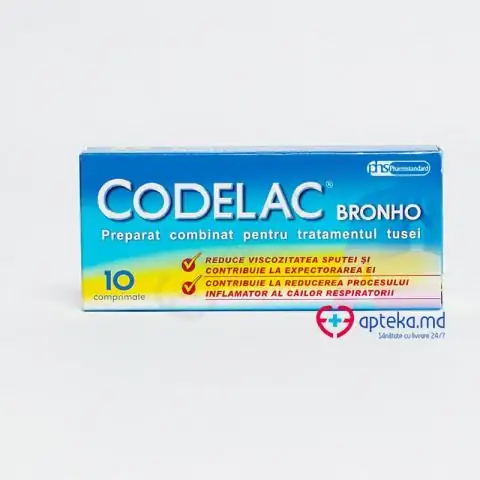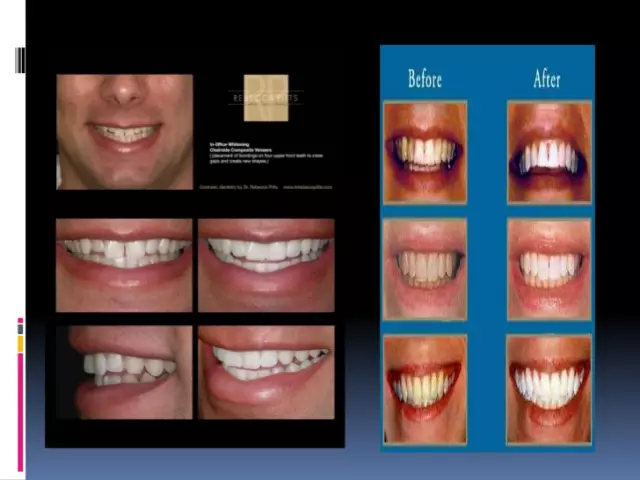- Author Rachel Wainwright wainwright@abchealthonline.com.
- Public 2023-12-15 07:39.
- Last modified 2025-11-02 20:14.
Ksizal
Ksizal: instructions for use and reviews
- 1. Release form and composition
- 2. Pharmacological properties
- 3. Indications for use
- 4. Contraindications
- 5. Method of application and dosage
- 6. Side effects
- 7. Overdose
- 8. Special instructions
- 9. Application during pregnancy and lactation
- 10. Use in the elderly
- 11. Drug interactions
- 12. Analogs
- 13. Terms and conditions of storage
- 14. Terms of dispensing from pharmacies
- 15. Reviews
- 16. Price in pharmacies
Latin name: Xyzal
ATX code: R06AE09
Active ingredient: Levocetirizine (Levocetirizine)
Manufacturer: YUSB PHARMA S. A. (Belgium), UCB Pharma, SpA (Italy), FARCHIM, SA (Switzerland)
Description and photo update: 2019-12-08
Prices in pharmacies: from 165 rubles.
Buy

Ksizal is an antiallergic agent, a blocker of histamine H 1 receptors.
Release form and composition
Dosage forms of Ksizal:
- Film-coated tablets: oval, almost white or white, with an embossed Y marking on one side (7 or 10 pcs. In blisters, in a cardboard box 1 or 2 blisters);
- Drops for oral administration: slightly opalescent, colorless liquid (10 or 20 ml in dark glass bottles with a dropper, 1 bottle in a cardboard box).
The active ingredient is levocetirizine dihydrochloride:
- 1 tablet - 5 mg;
- 1 ml drops - 5 mg.
Excipients:
- Tablets: microcrystalline cellulose, lactose monohydrate, magnesium stearate, colloidal silicon dioxide;
- Drops: sodium acetate, propylene glycol, glycerol 85%, sodium saccharinate, propyl parahydroxybenzoate, methyl parahydroxybenzoate, acetic acid, purified water.
Additionally, as part of the film coating of tablets: opadry Y-1-7000 (macrogol 400, titanium dioxide (E171), hypromellose).
Pharmacological properties
Pharmacodynamics
Levocetirizine, the active component of Xizal, is the R-enantiomer of cetirizine, which is a competitive histamine antagonist and blocks H 1 -histamine receptors. This compound affects the histamine-dependent stage of an allergic nature, and also reduces vascular permeability, inhibits the migration of eosinophils, and limits the release of inflammatory mediators.
Levocetirizine prevents the occurrence and facilitates the course of allergic reactions, has an antipruritic and antiexudative effect. For him, antiserotonin and anticholinergic action is practically uncharacteristic. In therapeutic doses, taking Ksizal does not lead to the development of a sedative effect.
Pharmacokinetics
Pharmacokinetic parameters of levocetirizine are linear. After oral administration, it is rapidly and almost completely absorbed from the gastrointestinal tract. Food intake does not affect the completeness of absorption, but somewhat slows down its rate. The maximum content of levocetirizine in blood plasma is observed after 0.9 hours and is 270 ng / ml. Determination of the equilibrium concentration becomes possible 2 days after administration.
The degree of binding of levocetirizine to blood plasma proteins is 90%. The volume of distribution is 0.4 l / kg. The bioavailability of this compound reaches 100%.
Less than 14% of levocetirizine is metabolized in the liver, forming a metabolite with practically zero pharmacological activity. The half-life in adult patients is 7.9 ± 1.9 hours, and the total clearance is 0.63 ml / min / kg. Approximately 85.4% of the taken dose of Ksizal is excreted in the urine, about 12.9% in the feces. In patients with renal failure with CC less than 40 ml / min, the clearance of the drug decreases. In patients on hemodialysis, the total clearance decreases by 80%, which requires correction of the dosage regimen. Less than 10% of levocetirizine is eliminated during a standard hemodialysis procedure lasting 4 hours.
Indications for use
According to the instructions, Ksizal is indicated for the symptomatic treatment of diseases and conditions of allergic genesis:
- Allergic rhinitis, seasonal (intermittent) and perennial (persistent);
- Pollinosis, or hay fever;
- Allergic conjunctivitis with characteristic symptoms such as itching, nasal congestion and sneezing, rhinorrhea, conjunctival hyperemia, lacrimation;
- Allergic dermatoses, occurring with itching and rashes;
- Urticaria, including chronic idiopathic urticaria;
- Quincke's edema.
Contraindications
- Terminal (end) stage of renal failure (with creatinine clearance (CC) less than 10 ml / min.);
- The period of pregnancy and breastfeeding;
- Individual hypersensitivity to drug components.
It is recommended to prescribe the drug with caution to patients with chronic renal failure (dose adjustment is necessary) and to elderly patients with pathology of age-related decrease in glomerular filtration.
The use of Ksizal tablets is contraindicated in patients with galactosemia or severe lactose intolerance, and in children under 6 years of age.
Ksizal drops cannot be used to treat children under the age of 2 years.
Instructions for the use of Ksizal: method and dosage
The drug in the form of tablets and drops is taken orally on an empty stomach or with meals.
The tablets should be swallowed whole with plenty of water.
Ksizal drops can be diluted with a small amount of water just before taking.
Recommended dosage for children over 6 years old and adults: 1 tablet or 20 drops (5 mg) once a day.
Children from 2 to 6 years old should take 5 drops 2 times a day.
Patients with renal insufficiency and the elderly need to adjust the daily dose of Ksizal.
The recommended dosage of Ksizal for patients with renal insufficiency: mild (CC 50-79 ml / min) - do not change the dose, moderate (CC 30-49 ml / min) - the patient is prescribed 5 mg per day 1 time in 2 days; severe (CC less than 30 ml / min.) - 5 mg per day 1 time in 3 days.
The dosage regimen for patients with impaired liver function does not need correction.
The duration of treatment depends on the clinical indication. With pollinosis, the drug should be taken for 1-6 weeks (on average), with chronic diseases (atopic dermatitis, perennial rhinitis) - 18 months.
Side effects
The use of Ksizal can cause side effects:
- From the side of the cardiovascular system: very rarely - tachycardia;
- From the nervous system: infrequently - fatigue, drowsiness and headache; rarely - general weakness; very rarely - agitation, aggression, convulsions, depression, visual impairment, hallucinations;
- From the respiratory system: very rarely - shortness of breath (dyspnea);
- From the side of metabolism: very rarely - increased body weight;
- From the digestive system: infrequently - dry mouth; rarely - abdominal pain; very rarely - diarrhea, nausea, changes in liver function tests, hepatitis;
- From the musculoskeletal system: very rarely - myalgia;
- Allergic reactions: very rarely - rash, pruritus, urticaria, anaphylaxis, angioedema.
Overdose
Signs of an overdose of Ksizal are drowsiness (in adult patients) and restlessness and anxiety, followed by drowsiness (in children). After taking the drug in high doses, it is necessary to rinse the stomach as soon as possible or induce artificial vomiting. After that, they take activated charcoal and prescribe symptomatic and supportive therapy. There is no specific antidote. The effectiveness of hemodiadesis is minimal.
special instructions
During the treatment period, it is recommended to treat alcohol consumption with caution.
The use of Ksizal in the recommended doses does not cause undesirable effects that affect the patient's ability to drive vehicles and mechanisms. Despite this, during the period of treatment, potentially hazardous activities should be avoided, the implementation of which requires concentration of attention and a high speed of psychomotor reactions.
Application during pregnancy and lactation
Adequate and strictly controlled clinical studies on the safety of using Ksizal in pregnant women have not been conducted, therefore it is recommended to refrain from prescribing it during pregnancy. Levocetirizine passes into breast milk, so if you need to take it during lactation, you should stop breastfeeding until the end of the course of treatment. Experimental studies on animals did not reveal any direct or indirect adverse effects of levocetirizine on the developing fetus (including the postnatal period), the course of pregnancy and childbirth also proceeded within normal limits.
Use in the elderly
Since levocetirizine is excreted through the kidneys, when it is prescribed to elderly patients, dose adjustment is required in accordance with the creatinine clearance value.
Drug interactions
The drug interaction of levocetirizine with other drugs has not been established.
Analogs
The analogues of Ksizal are: Glenzet, Zenaro, Suprastinex, Tsesera, Elset, Aleron, Alerzin.
Terms and conditions of storage
Keep out of the reach of children:
- Tablets: in a dry place at temperatures up to 25 ° C;
- Drops: in a dark place at temperatures up to 30 ° C.
Shelf life: tablets - 4 years, drops - 3 years.
After opening the bottle, the drops are suitable for use within 3 months.
Terms of dispensing from pharmacies
Dispensed by prescription.
Reviews about Ksizal
Reviews of Ksizal from patients suffering from allergic reactions indicate its fast action, effectiveness and ease of use. However, patients are advised not to forget about its strong hypnotic effect, especially for those who often drive a car. When using the drug in children, most parents leave positive reviews.
Price for Ksizal in pharmacies
The approximate price of Ksizal tablets is 350-366 rubles (7 pcs per pack), 405-460 rubles (10 pcs per pack) and 580-626 rubles (14 pcs per pack). You can buy drops for oral administration for approximately 421-498 rubles (for a 10 ml bottle).
Ksizal: prices in online pharmacies
|
Drug name Price Pharmacy |
|
Ksizal (drops) 5 mg / ml drops for oral administration 10 ml 1 pc. RUB 165 Buy |
|
Reviews Ksizal (drops) RUB 165 Buy |
|
Ksizal 5 mg film-coated tablets 7 pcs. 335 RUB Buy |
|
Ksizal tablets p.p. 5mg 7 pcs. 342 r Buy |
|
Ksizal tablets p.p. 5mg 7 pcs. UCB 398 RUB Buy |
|
Ksizal 5 mg film-coated tablets 10 pcs. 410 RUB Buy |
|
Ksizal drops for internal approx. 5mg / ml vial 10ml 424 r Buy |
|
Ksizal drops for internal approx. 5mg / ml 10ml 447 r Buy |
|
Ksizal tablets p.p. 5mg 10 pcs. 459 r Buy |
|
Ksizal tablets p.p. 5mg 10 pcs. RUB 513 Buy |
|
Ksizal 5 mg film-coated tablets 14 pcs. 593 r Buy |
|
Ksizal tablets p.p. 5mg 14 pcs. RUB 672 Buy |
| See all offers from pharmacies |

Anna Kozlova Medical journalist About the author
Education: Rostov State Medical University, specialty "General Medicine".
Information about the drug is generalized, provided for informational purposes only and does not replace the official instructions. Self-medication is hazardous to health!






